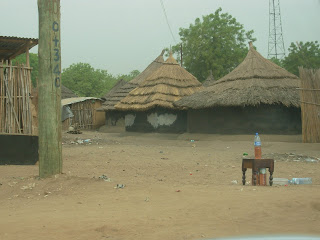This is something of a Wild West boomtown. Prices jumping through the roof as more aid workers pile in, shortages of housing for the workers, and tent “camps” surrounded by high walls, barbed wire and armed guards sprouting up all over. UN staff live in a camp made of metal shipping containers. Lots of bars down by the Nile. Prices are also impacted by the current unrest in Kenya as all supplies here come in by road from Uganda, originating at the port in Kenya. There were gasoline shortages for the past two weeks.
I’m at the Beijing Juba Hotel (3 guesses who owns the hotel) and am in one of three newly constructed pre-fab units, each of which has 60 rooms along one long corridor that gradually does down hill. You come in from the brilliant sunshine outside and have to move cautiously as you can’t see the steps down every few yards. They’re building more of these wings now, and everything comes by container from China to Kenya, then by truck through Uganda.
My room is basic – one bare fluorescent tube on the ceiling, no bedside lamp, a TV that has only one channel (broadcasting in Dinka, the local language in daytime only), AC, and a bathroom that is also the shower (allowing for multi-tasking) with only one water temp. You stand beside the toilet as the shower head is wall mounted. Of course, this also means you track water all over the place, but in this climate is evaporates quickly. To shower, you take the towel and toilet paper out of the room when you turn the water on. The power usually cuts out in the middle of the night, meaning the AC also cuts out.
The hotel lobby, which opens into the bar/restaurant is classic Asian – cavernous (think high school gym) and largely unadorned. There is a massive wall mural behind the front desk of the Great Wall. The bar/restaurant is several steps down on a tile floor (no hand rails, uneven steps, some are a drop of 18”) and then it’s terraced down from there, again cavernous and dimly lit. The servers have poor English, are barely literate and have no service skills. I’m sure they see all the foreigners as bizarre creatures from another world and totally alien to their experience. However, the beer (Ugandan) is cold, as sometimes is the food.
Buffet breakfast in the hotel – instant coffee, plate of hard boiled eggs, sausages deep fried to death, plain dry white bread, tub or margarine, two plates of fresh fruit, two jugs of juice, bottled water. Very thankful I brought lots of snack/protein bars in my suitcase.
Check the hotel URL. Makes no mention of living in trailers. Also notice that the URL is registered in China.
http://www.beijingjubahotel.cn/ We joke that the Chinese government is reading our e-mail as we use the hotel WiFi. Maybe it’s not a joke?
Oh, you know how some hotels have a “hotel dog” in the lobby? Not in Juba. We’re in Africa after all. There is a semi-tame monkey running around the lobby, loose, this morning. Fair size too. Likely a non-union staff person working for peanuts. Sorry, couldn’t resist that line! I’ll have to get a picture. (Note to Kimpton Hotels – top that!).






























